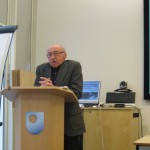200th posting – Yesterday’s world
Wednesday, January 18th, 2012 There is also work on UK educational films. (more…)
There is also work on UK educational films. (more…) There is also work on UK educational films. (more…)
There is also work on UK educational films. (more…)On 8th January 2012 Dan Weinbren gave a presentation on ‘The roots and branches of the OU’s disruptive online environment’ to the World Universities Forum.
Inspired by the success of the World Economic Forum held each year in Davos, the World Universities Forum has developed into a key site for academic discussion on the current state and future possibilities of the university. Now in its fifth year the WUF enables the exchange of ideas between delegates from dozens of countries around the world, numerous academic disciplines, and a range of professional areas including research, university administration, business, and policy-making. Read his abstract here: (more…)
The OU opened in 1969, which makes it almost a chronological twin of the Ben-Gurion University of the Negev. The latter opened as the Negev Institute for Higher Education a few years earlier, had a few other antecedents, including roots in the Dimona nuclear research institute and became a university in 1969. Labour Party Prime Minister Harold Wilson promised that the Open University would support the spread of technology and in Israel it was an interest in science and technology that helped to drive the project to develop BGU. (more…)
The Open University is largely funded by the state and yet it has supported the creation of voluntary organisations such as the FACHRS. Getting the balance right between the state and other sectors can be tricky. On the centenary of legislation which enabled voluntary bodies to administrate on behalf of the state Dan Weinbren reflects on these matters.
 The recent announcement to staff at the OU that current economic frameworks indicate that the OU needs to market itself is a reminder that the OU has always been in the marketplace, and that it has long had an interest in sustaining popularity. For many years other state-funded universities did not feel any need to compete. Until the era of grant-funding these institutions selected young people who often studied at the university near their homes. Even after grants were provided many universities felt little need to prove themselves worthy either to the public at large or the politicians.
The recent announcement to staff at the OU that current economic frameworks indicate that the OU needs to market itself is a reminder that the OU has always been in the marketplace, and that it has long had an interest in sustaining popularity. For many years other state-funded universities did not feel any need to compete. Until the era of grant-funding these institutions selected young people who often studied at the university near their homes. Even after grants were provided many universities felt little need to prove themselves worthy either to the public at large or the politicians.
By contrast the OU has always been out there, seeking and gaining, popular acclaim. This is because
 News has reached us of the death of Vic Finkelstein on 30 November. Born in 1938, Finkelstein grew up in South Africa and was imprisoned for anti-apartheid activities in the 1960s. He came to Britain in 1968, where he helped found UPIAS (Union of the Physically Impaired Against Segregation) and developed the ‘Social Model of Disability’. His view was that the focus should be ‘on the need to change the disabling society rather than make us fit for society’. Finkelstein was a tutor on the OU’s ground-breaking disability course P853 The handicapped person in the community, which began in 1975 and to which Finkelstein contributed to several broadcasts. (more…)
News has reached us of the death of Vic Finkelstein on 30 November. Born in 1938, Finkelstein grew up in South Africa and was imprisoned for anti-apartheid activities in the 1960s. He came to Britain in 1968, where he helped found UPIAS (Union of the Physically Impaired Against Segregation) and developed the ‘Social Model of Disability’. His view was that the focus should be ‘on the need to change the disabling society rather than make us fit for society’. Finkelstein was a tutor on the OU’s ground-breaking disability course P853 The handicapped person in the community, which began in 1975 and to which Finkelstein contributed to several broadcasts. (more…)
 One of the most relevant presentations to the OU’s own history at last week’s What have we learnt? forum was Professor Judith George’s paper on supporting isolated remote learners. Judith spoke of the challenges in establishing the OU in Scotland, with its specific geography and politics. However, it was essential that the OU in its early days grapple with these issues if it was to be recognised as a British institution. (more…)
One of the most relevant presentations to the OU’s own history at last week’s What have we learnt? forum was Professor Judith George’s paper on supporting isolated remote learners. Judith spoke of the challenges in establishing the OU in Scotland, with its specific geography and politics. However, it was essential that the OU in its early days grapple with these issues if it was to be recognised as a British institution. (more…)
 One of the outcomes of the What Have We Learnt? Event is that we have decided to build stronger links between researchers interested in how universities create and maintain communities. This interest connects to the interests of others at the OU and across the UK.
One of the outcomes of the What Have We Learnt? Event is that we have decided to build stronger links between researchers interested in how universities create and maintain communities. This interest connects to the interests of others at the OU and across the UK.
Paul Manners is the director of the National Co-ordinating Centre for Public Engagement. The Centre was set up in 2008 in recognition of a looming crisis in public trust and understanding of higher education. The THES of 24th November 2011 quotes Paul as saying that it is
 The History of the OU Project was pleased to host a successful one-day forum What have we learnt? Transmitting knowledge, facilitating learning on 29 November. With papers from academics from a variety of traditions this event enabled educationalists, educational technologists, historians and adult education practitioners to gain new perspectives on the OU and the wider development of the HE sector since 1945.
The History of the OU Project was pleased to host a successful one-day forum What have we learnt? Transmitting knowledge, facilitating learning on 29 November. With papers from academics from a variety of traditions this event enabled educationalists, educational technologists, historians and adult education practitioners to gain new perspectives on the OU and the wider development of the HE sector since 1945.
A Senior Research Fellow in IET at the OU, Martyn Cooper, attended the event and swiftly told his colleagues, ‘Today I attended the excellent “What have we learnt? – Transmitting knowledge, facilitating learning c1960-2010” seminar organised by the History of the OU project’. His blog posting is here http://martyncooper.wordpress.com/2011/11/29/what-have-we-learnt-transmitting-knowledge-facilitating-learning-c1960-2010/
Shortly to be published is Devin Orgeron, Marsha Orgeron (pictured) and Dan Streible (eds.) Learning with the Lights Off. Educational Film in the United States, OUP, 2011. This is about film’s educational uses in twentieth-century America. Illustrated with over 90 illustrations of rarely seen educational films, the publisher suggests that this collection of essays examines ‘some crucial aspect of educational film history, ranging from case studies of films and filmmakers, to analyses of genres, to broader historical assessments’. It also suggests that there will be links to many of the films.
For historians of the OU this could be of interest as Harold Wilson was influenced by the owner of Encyclopaedia Britannica Films, William Benton. Walter Perry argued that Benton was one of the men whose vision of education for all, through correspondence teaching and the use of the mass media, contributed to the decision to found the Open University. An advocate of radio, in the 1950s Benton toured the world with his films arguing that ‘the cold war between the open and closed societies is likely to be won in the world’s classrooms, libraries, and college and university laboratories’. He also sponsored tours of the USA taken by Wilson. In return Wilson sought to help Benton to overcome his ‘problem’ concerning the British quota on the number of foreign films which could be shown. For Benton and Wilson widening access to knowledge, business and politics could all advance together.